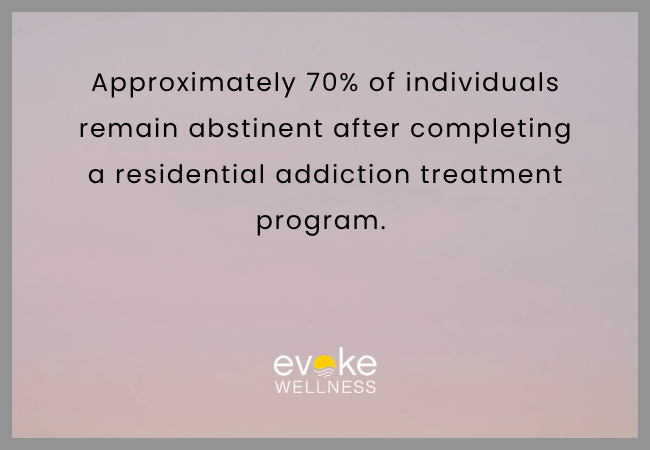Recovery from mental health challenges or co-occurring substance use disorders requires more than just motivation—it requires a structured, stable environment to rebuild, reflect, and grow. While there are many different treatment options available, residential rehab stands out for its ability to offer a strong foundation that supports sustainable, long-term healing. At Evoke Wellness, we’ve seen firsthand how transformative this level of care can be.
Structure and stability are two of the most critical elements in early recovery. Without them, individuals often find themselves vulnerable to relapse, emotional setbacks, or a return to unhealthy patterns. Residential rehab addresses these challenges head-on by removing external distractions and establishing routines that promote mental clarity, emotional regulation, and personal growth.
Why Structure Matters in Recovery
Structure isn’t just about daily schedules or meal times—it’s about creating predictability and purpose during a period of immense vulnerability. Many individuals entering treatment have experienced months or years of chaos, inconsistency, or isolation. Residential rehab introduces a daily rhythm that includes therapy sessions, wellness activities, downtime, and healthy meals, all contributing to a sense of normalcy.
In the context of healing, structure gives people a reliable framework to build confidence. Waking up at the same time each day, participating in group therapy, attending one-on-one counseling, and practicing mindfulness are all parts of a rhythm that foster emotional balance. Over time, these structured days translate into stable weeks, and eventually into lifestyles that support long-term recovery.
For individuals struggling with anxiety, depression, trauma, or co-occurring disorders, unpredictability is often a trigger. By establishing routines and accountability, residential programs help reduce emotional stressors and prevent impulsive behavior. Most importantly, this structure isn’t just imposed—it’s internalized. Clients learn how to maintain it even after transitioning out of treatment.
Stability as a Catalyst for Change
In addition to structure, emotional and environmental stability plays a major role in successful recovery. Residential rehab offers a safe and controlled setting, free from many of the stressors, triggers, and toxic influences that may have contributed to a person’s mental health or addiction issues.
Unlike outpatient settings, where individuals might return each day to unstable home environments, residential treatment provides a 24/7 supportive space. The consistency of care allows clients to address deep-rooted issues without distraction. There’s time and space to reflect, to process trauma, and to gain insight in a community of peers and professionals who understand the journey.
Being physically removed from old routines, toxic relationships, or triggering environments gives clients a psychological break. It allows them to focus fully on healing, to reset both emotionally and neurologically. Stability, in this case, isn’t just external—it becomes internalized as confidence grows and self-destructive patterns lose their grip.
Personalized Therapeutic Support
Another key advantage of residential rehab is access to comprehensive therapeutic support. Clients don’t just receive treatment—they receive individualized care. At Evoke Wellness, we create personalized plans that adapt over time based on progress, needs, and feedback. This level of responsiveness is vital in early recovery, where emotional landscapes shift rapidly.
Whether someone is dealing with trauma, grief, substance use, or a psychiatric condition, tailored therapy ensures they’re receiving the right tools at the right time. Individual counseling may be complemented by cognitive-behavioral therapy (CBT), dialectical behavior therapy (DBT), group support, experiential therapies, and wellness practices. This blend helps individuals engage with their recovery on multiple levels—mental, emotional, physical, and spiritual.
Additionally, the sense of community found in residential rehab can’t be overstated. Many people battling mental health or substance use issues feel deeply isolated. Being part of a group of peers who are walking similar paths helps reduce shame and fosters belonging, which is essential for healing.
The Importance of Daily Routine
A consistent daily schedule supports mental health by reducing decision fatigue and creating habits that stick. Mornings often begin with mindfulness or fitness activities, followed by therapeutic sessions, meal times, journaling, group therapy, recreational activities, and structured free time.
These routines may seem simple, but for someone in recovery, they are powerful. The act of showing up, of participating, of sticking to a schedule—even on tough days—builds resilience. It also trains the brain to associate structure with safety and wellness, which is particularly valuable for those with a history of trauma or anxiety.
As healing progresses, clients learn to reintroduce flexibility without losing their routine. This balance is key for long-term success once they leave the treatment environment.
Gradual Progression Toward Independence
Residential rehab doesn’t just offer short-term healing—it sets the stage for long-term growth. One of the most empowering aspects of the process is how individuals gradually move from dependence on the structure to confident independence. As skills develop and stability strengthens, clients gain clarity around their goals, boundaries, and identities.
This phase often includes practicing life skills, managing responsibilities within the facility, and participating in therapy focused on reintegration. Whether they’re preparing to transition into a Partial Hospitalization Program in Miramar, Florida or an outpatient setting, clients leave residential rehab better equipped to navigate the challenges of daily life.
The goal isn’t to shield individuals from the world—it’s to prepare them to reenter it with stronger emotional and psychological tools. And for many, that preparation begins with learning how to function inside a safe, stable system before applying those lessons outside.
Integrating Family and Support Systems
Healing doesn’t happen in a vacuum. Residential rehab programs often incorporate family therapy, education, and support services to help loved ones understand mental health and addiction. This work is essential in rebuilding trust and forming a healthy, supportive environment for post-treatment life.
Families learn how to communicate effectively, set boundaries, and offer encouragement without enabling. They also have the opportunity to process their own experiences, which are often filled with confusion, pain, and fear. These conversations—though difficult—are often the foundation of long-term relational repair.
Supporting the broader ecosystem around the individual strengthens the overall recovery outcome. It also ensures that when clients leave treatment, they’re returning to an environment better equipped to support their wellness journey.
Long-Term Wellness Planning
One of the cornerstones of success in residential rehab is planning for what comes next. Discharge planning begins early in treatment and evolves over time. It includes identifying triggers, creating relapse prevention strategies, building aftercare support, and connecting clients with long-term Mental Health Treatment Programs in Miramar, Florida.
Clients may continue care in outpatient therapy, engage in community support groups, or access wellness services that keep them on track. Some may transition to sober living environments or seek mentorship from peers in recovery. Regardless of the next step, the goal is to extend the structure and stability of treatment into life beyond the facility.
Having a clear, actionable plan builds confidence. It gives individuals a roadmap to follow—and more importantly, the belief that they can succeed.
Why Choose Us?
At Evoke Wellness, we specialize in providing individualized care rooted in compassion and clinical excellence. In our Behavioral Health Treatment Center Miramar, Florida, clients receive a high level of support in a warm and welcoming setting designed for healing. From our experienced staff to our integrative approach, we ensure that every person who walks through our doors feels seen, heard, and empowered.
We believe that structure and stability are not just features of our programs—they are the foundation. And with our commitment to evidence-based treatment, trauma-informed care, and community support, we walk alongside our clients through every phase of recovery.
Conclusion
Structure and stability are often the missing ingredients in recovery. When individuals are given the space, support, and guidance to rebuild their lives within a structured environment, true transformation becomes possible. Residential rehab offers the consistency needed to heal from the inside out—free from distractions, full of support, and grounded in routine.
At Evoke Wellness, our approach to Residential Mental Health Treatment in Miramar, Florida is designed to offer more than just short-term relief. We provide a stable foundation where individuals can rediscover their strength and create lives defined not by the past, but by new purpose, confidence, and clarity. The journey isn’t always easy—but in the right setting, it is absolutely possible.
Frequently Asked Questions (FAQs)
What is residential rehab and how does it differ from outpatient treatment?
Residential rehab requires individuals to live onsite during treatment, offering 24/7 support and structure. Outpatient programs allow participants to return home daily while attending scheduled therapy sessions.
Why is structure important in addiction and mental health recovery?
Structure helps individuals develop healthy routines, stay accountable, and manage symptoms or triggers in a predictable and supportive environment—essential for long-term healing.
What types of therapy are offered in residential rehab?
Therapies often include cognitive-behavioral therapy (CBT), group counseling, individual therapy, family therapy, and experiential therapies tailored to each client’s needs.
How long does a residential mental health treatment program usually last?
The length can vary depending on the individual’s condition and progress, but most residential programs range from 30 to 90 days or longer when clinically necessary.
Who should consider residential rehab over other treatment options?
Residential rehab is best suited for those needing a high level of care, who have struggled with relapse, co-occurring disorders, or lack a stable home environment during early recovery.



